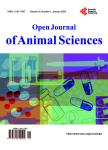Living with or Eradicating Poisonous Snakes in Densely Populated Caribbean Islands—A Socio-Ecological Challenge for the French West Indies
生活与或在为法国的韦斯特印度地方的浓密地占据的加勒比海 IslandsA Socio 生态的挑战的根除的有毒的蛇作者机构:UMR 8053 LC2SCentre National de la Recherche ScientifiqueCampus de SchoelcherCedexFrance UMR 228 ESPACE-DEVUniversite de La ReunionInstitut de Recherche pour le DeveloppementSainte-ClotildeFrance Research center EA 929 AIHP-GEODE CaraibeUniversite des AntillesCampus de SchoelcherCedexFrance UFR Mixte de Medecine et de PharmacieUniversite de RouenHaute NormandieCedexFrance Universidade Federal do ParaInstituto de CienciasjuridicasCidade Universitaria Prof.Jose da Silveira NettoBelemBresil
出 版 物:《Open Journal of Animal Sciences》 (动物科学期刊(英文))
年 卷 期:2017年第7卷第4期
页 面:405-413页
学科分类:1002[医学-临床医学] 100214[医学-肿瘤学] 10[医学]
基 金:the support of“Investissements d’Avenir”of the French National Agency for Research(CEBA ref.ANR-10-LABX-25-01)
主 题:Caribbean Islands Conservation Endemic Species Nature-Society Snake
摘 要:The lancehead (Bothrops lanceolatus) is a poisonous snake endemic to Martinique, an island in the Lesser Antilles arc. Today, this snake is on the verge of extinction. The recorded number of snakes killed yearly between 1970 and 2002 decreased by 97%. Despite the production of an antivenom in 1993, the local authorities set up a financial reward to encourage the eradication of lancehead snakes. Today the local population still perceives the snake as a threat, due to its fatal venom and its fierce behaviour. The case study of the lancehead in Martinique highlights the need to develop integrated strategies to conserve species of poisonous snakes on densely populated islands. This requires innovative, cross-sectoral strategies that involve decision-makers working along with multi-disciplinary scientists. Approaching the complexity of ecosystems through the socio-ecological prism implies, conversely, linking up the domains of science and technology, life and environmental sciences, and human and social sciences, through interactions based on sharing common



